Using the score thermometer
-
Getting used to the new version's score thermometer (still improperly called Word strength rather than Score strength, to the discredit of the obdurate administrators) has been interesting. Though immediately captured by it, I soon afterwards found myself frustrated in vain attempts to attain the maximum score when – as if often turned out – the word was one I was unfamiliar with and couldn't have guessed. The ultimate solution to this was not to insist on hitting the absolute maximum, but rather something that at least approached it when I at least knew that a better word was possible.
If anyone has any particular tricks on using the thermometer, I'd like to see them. I think I may have worked out a couple on my own, however, that others might find useful.
One thing is that I've automated the calculation of the maximum score using Keyboard Maestro on a Mac. After placing the mouse so I can see the percentage, I type the macro's keycode, am prompted to enter the number of points and the percentage, and then see the result of the division in Mac Spotlight, which closes automatically after a few seconds. (If I don't catch or forget the max score, I can easily reopen Spotlight and it's still there.) I note the max score in the window of a text file adjacent to the Lexulous window, taking it with several possible words to be sure of the score. If I get 58.6, 58.9, 59.1 and 59.2, for example, I can be sure that the max score is 59. This is then what I shoot for.
Another technique that I think some of you will really like if you're not already doing it (as I suppose many aren't) is to note the max score also immediately after making a move. Then, if it stays the same after your opponent plays, you'll know the word you want is not where your opponent played. On the other hand, if the max score is now higher, you'll know you'll want to play on your opponent's last move, and you'll know where that is on the board. This sometimes proves to be an immense help.
What's most prompting me to write now, however, is an interesting move that has shown me that at least under certain circumstances I can discover a max-score word without being familiar with it or being able to guess it. I was playing a US-dictionary game with someone on this forum who was ahead by 31 points with only 18 unseen tiles, and my miserable rack was AEEIOOOR, 7 vowels and 1 consonant. Ordinarily I would swap to get rid of the impossible vowel predominance, then my opponent would leap even further ahead and I would probably lose the game. The score thermometer, however, indicated that a 29-point word was possible, even with my crappy rack. I could see that it would take a 5- or 6-letter word to make 29 points, so I would get rid of 4 or 5 vowels by making the max word, achieving the same result as swapping but getting the points I needed at the same time. I figured there weren't many places on the board where 5 or 6 1-point letters could be combined for 29 points, and this was indeed the case. There was nowhere I could place letters horizontally to get this total, and only 4 where I could place them vertically, as shown here.
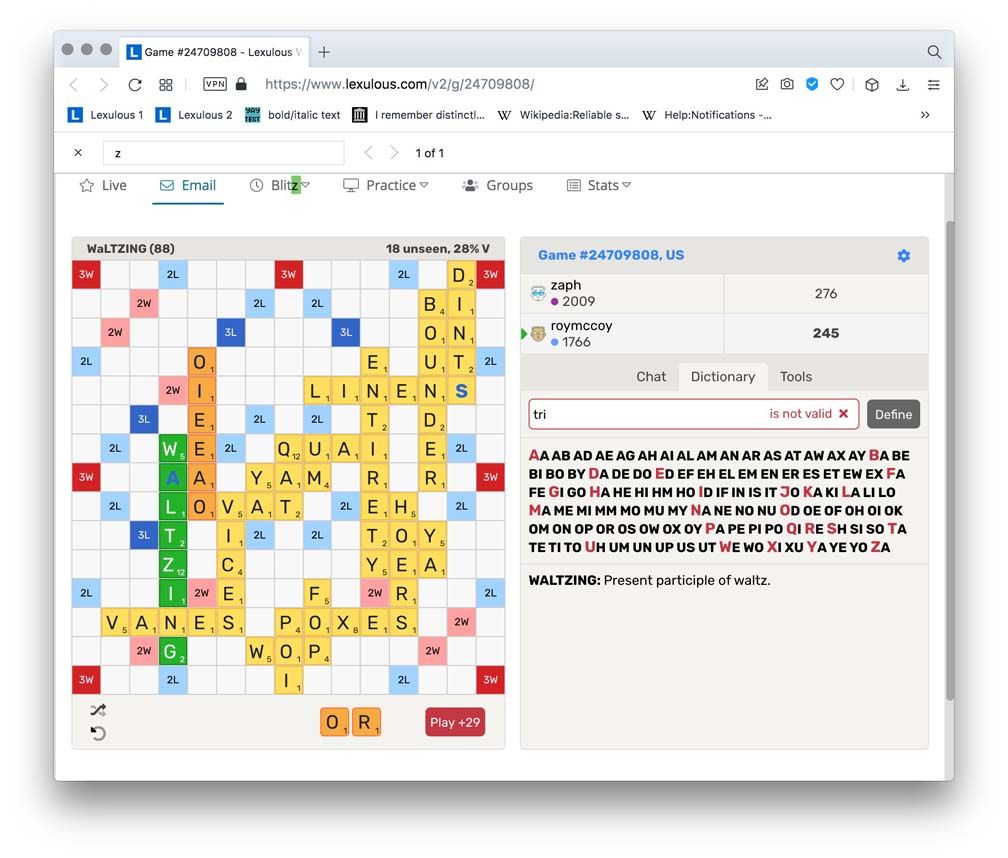
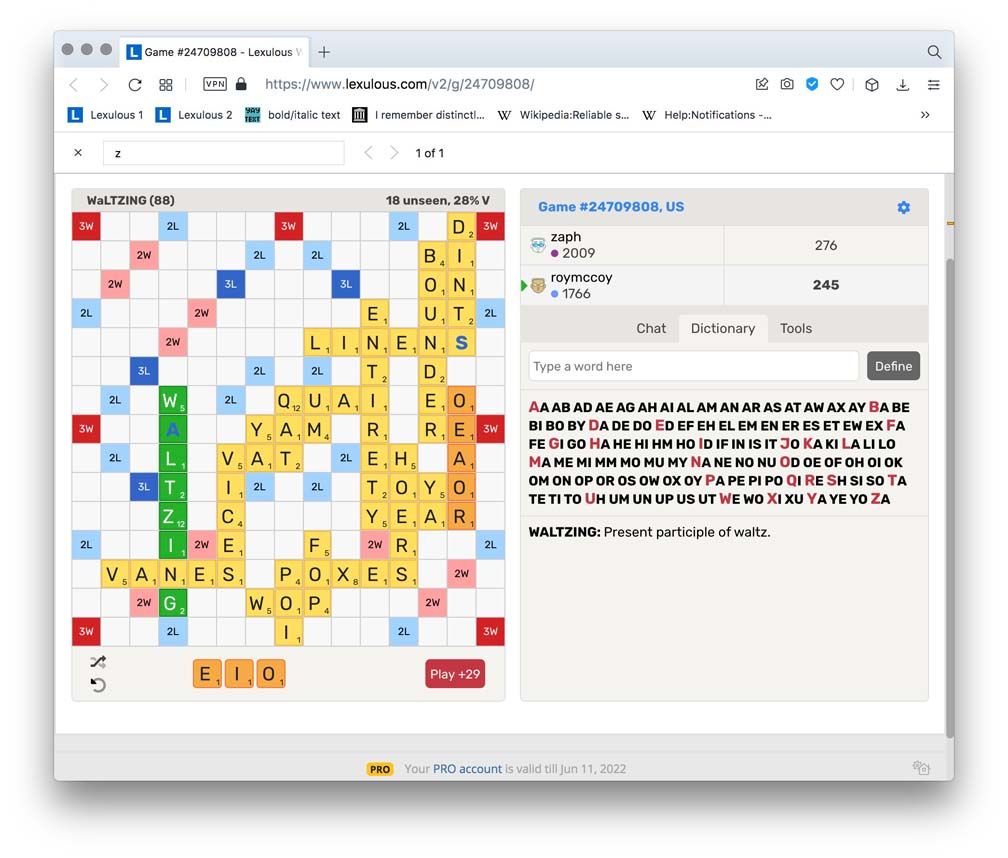
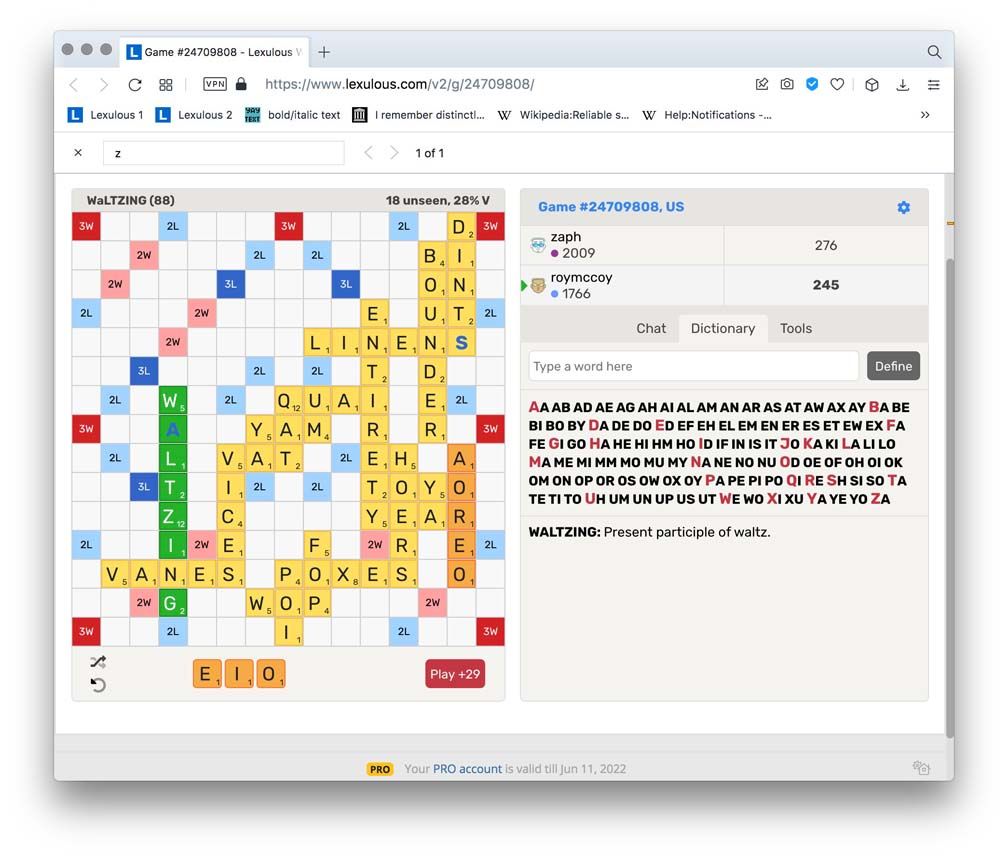
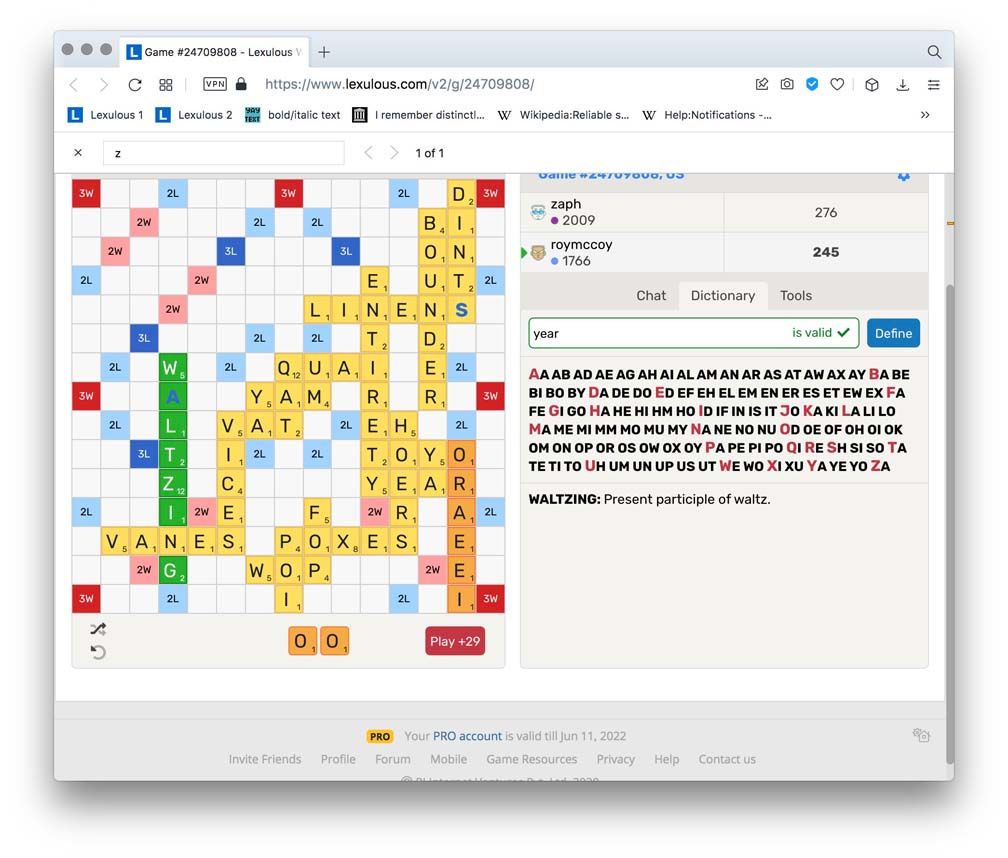
Six letters ending in the O of LOVAT ("A dusty green-blue colour") seemed unlikely, and I tried all of the combinations of the fourth one and none of them worked. That left the second and third, but I realized it couldn't be the second because we were using the US dictionary so I couldn't use EA or EE, leaving only ER but I couldn't make that because I needed the R for YEAR (and an O for TOYO above). This left only the third, for which I tried the possible combinations before finally coming up with OORIE ("The pearl oyster"), which gave me the 29 points and brought me up even with my opponent, making it a tight game that I have a better chance of winning – though I likely won't because I'm screwed with too many vowels again and my opponent has high-scoring consonants. But it was fun coming up with OORIE and having another occasion to criticize the Lexulous administrators. -
Getting used to the new version's score thermometer (still improperly called Word strength rather than Score strength, to the discredit of the obdurate administrators) has been interesting. Though immediately captured by it, I soon afterwards found myself frustrated in vain attempts to attain the maximum score when – as if often turned out – the word was one I was unfamiliar with and couldn't have guessed. The ultimate solution to this was not to insist on hitting the absolute maximum, but rather something that at least approached it when I at least knew that a better word was possible.
If anyone has any particular tricks on using the thermometer, I'd like to see them. I think I may have worked out a couple on my own, however, that others might find useful.
One thing is that I've automated the calculation of the maximum score using Keyboard Maestro on a Mac. After placing the mouse so I can see the percentage, I type the macro's keycode, am prompted to enter the number of points and the percentage, and then see the result of the division in Mac Spotlight, which closes automatically after a few seconds. (If I don't catch or forget the max score, I can easily reopen Spotlight and it's still there.) I note the max score in the window of a text file adjacent to the Lexulous window, taking it with several possible words to be sure of the score. If I get 58.6, 58.9, 59.1 and 59.2, for example, I can be sure that the max score is 59. This is then what I shoot for.
Another technique that I think some of you will really like if you're not already doing it (as I suppose many aren't) is to note the max score also immediately after making a move. Then, if it stays the same after your opponent plays, you'll know the word you want is not where your opponent played. On the other hand, if the max score is now higher, you'll know you'll want to play on your opponent's last move, and you'll know where that is on the board. This sometimes proves to be an immense help.
What's most prompting me to write now, however, is an interesting move that has shown me that at least under certain circumstances I can discover a max-score word without being familiar with it or being able to guess it. I was playing a US-dictionary game with someone on this forum who was ahead by 31 points with only 18 unseen tiles, and my miserable rack was AEEIOOOR, 7 vowels and 1 consonant. Ordinarily I would swap to get rid of the impossible vowel predominance, then my opponent would leap even further ahead and I would probably lose the game. The score thermometer, however, indicated that a 29-point word was possible, even with my crappy rack. I could see that it would take a 5- or 6-letter word to make 29 points, so I would get rid of 4 or 5 vowels by making the max word, achieving the same result as swapping but getting the points I needed at the same time. I figured there weren't many places on the board where 5 or 6 1-point letters could be combined for 29 points, and this was indeed the case. There was nowhere I could place letters horizontally to get this total, and only 4 where I could place them vertically, as shown here.




Six letters ending in the O of LOVAT ("A dusty green-blue colour") seemed unlikely, and I tried all of the combinations of the fourth one and none of them worked. That left the second and third, but I realized it couldn't be the second because we were using the US dictionary so I couldn't use EA or EE, leaving only ER but I couldn't make that because I needed the R for YEAR (and an O for TOYO above). This left only the third, for which I tried the possible combinations before finally coming up with OORIE ("The pearl oyster"), which gave me the 29 points and brought me up even with my opponent, making it a tight game that I have a better chance of winning – though I likely won't because I'm screwed with too many vowels again and my opponent has high-scoring consonants. But it was fun coming up with OORIE and having another occasion to criticize the Lexulous administrators.@roymccoy And you called me a blah blah blah. Wow.
-
@roymccoy And you called me a blah blah blah. Wow.
@dan-mitchell
No, that was @sparks. -
@dan-mitchell
No, that was @sparks.@roymccoy Sparks said I was being a blah blah blah. You then said I am a blah blah blah.
-
@roymccoy Sparks said I was being a blah blah blah. You then said I am a blah blah blah.
@dan-mitchell
No, I said I resented my friend Dan Mitchell being called a blah blah blah even if he was. This was not to say that you necessarily were one, though I suppose it suggested the possibility. -
@roymccoy Sparks said I was being a blah blah blah. You then said I am a blah blah blah.
@dan-mitchell
I think you should be appreciative of the idea of noting the max score both before and after your move (unless you were already doing that), rather than unfairly accusing me of making an assertion that I didn't. -
@dan-mitchell
I think you should be appreciative of the idea of noting the max score both before and after your move (unless you were already doing that), rather than unfairly accusing me of making an assertion that I didn't.@roymccoy Fair enough. I guess I took it the wrong way.
BTW, nice post. And 'score thermometer' is a nice way of putting it.
-
@roymccoy Fair enough. I guess I took it the wrong way.
BTW, nice post. And 'score thermometer' is a nice way of putting it.
@dan-mitchell
No, you took it the right way, ha ha.
Don't mind me, I'm just fooling around and enjoying myself... sometimes at the expense of innocent parties! (Among the latter are not included, however, the Lexulous administrators, who merit perpetual scorn and abuse.)
-
Here's another interesting play. It's at the end of the game and I'm going to win regardless, but the game is now like a crossword, sudoku or cryptogram, calling for the solution of a puzzle.
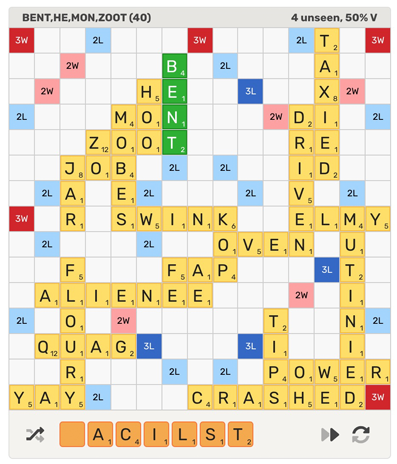
My three calculated max scores are 90 even and 90.9 before my opponent's last move (BENT), and 91.7 after. This suggests that a figure like 91.7 will not round up if there's a score below 91.0, but will round down to the in-between figure. In any event 91, which I think it will be, is a large score and will ordinarily be obtainable only with a triple. The lack of a significant change in the max score indicates that it's still in the same place, and it couldn't be at the upper left anyway since no tile, even the blank, works with BENT. As neither the lower-left nor lower-right triple is available, that leaves only the upper right. A 1-point letter on the 2L yields 88, the 2-point T 91, and the 4-point C 97. So it has to be a 7-tile bingo triple with the T on the 2L.
My work, then, is cut out for me. Uh...
ASSTICLY, lol.
Who can get this? I won't come back till I've found it or given up. Good luck. No cheating!
-
Here's another interesting play. It's at the end of the game and I'm going to win regardless, but the game is now like a crossword, sudoku or cryptogram, calling for the solution of a puzzle.

My three calculated max scores are 90 even and 90.9 before my opponent's last move (BENT), and 91.7 after. This suggests that a figure like 91.7 will not round up if there's a score below 91.0, but will round down to the in-between figure. In any event 91, which I think it will be, is a large score and will ordinarily be obtainable only with a triple. The lack of a significant change in the max score indicates that it's still in the same place, and it couldn't be at the upper left anyway since no tile, even the blank, works with BENT. As neither the lower-left nor lower-right triple is available, that leaves only the upper right. A 1-point letter on the 2L yields 88, the 2-point T 91, and the 4-point C 97. So it has to be a 7-tile bingo triple with the T on the 2L.
My work, then, is cut out for me. Uh...
ASSTICLY, lol.
Who can get this? I won't come back till I've found it or given up. Good luck. No cheating!
Got it: SCATTILY for 91. Yay!
-
Here's another interesting play. It's at the end of the game and I'm going to win regardless, but the game is now like a crossword, sudoku or cryptogram, calling for the solution of a puzzle.

My three calculated max scores are 90 even and 90.9 before my opponent's last move (BENT), and 91.7 after. This suggests that a figure like 91.7 will not round up if there's a score below 91.0, but will round down to the in-between figure. In any event 91, which I think it will be, is a large score and will ordinarily be obtainable only with a triple. The lack of a significant change in the max score indicates that it's still in the same place, and it couldn't be at the upper left anyway since no tile, even the blank, works with BENT. As neither the lower-left nor lower-right triple is available, that leaves only the upper right. A 1-point letter on the 2L yields 88, the 2-point T 91, and the 4-point C 97. So it has to be a 7-tile bingo triple with the T on the 2L.
My work, then, is cut out for me. Uh...
ASSTICLY, lol.
Who can get this? I won't come back till I've found it or given up. Good luck. No cheating!
@roymccoy
Without your post, I would have put LATTES.
With your post, I only thought of SCITTLE, SEATTLE ha ha! -
@roymccoy
Without your post, I would have put LATTES.
With your post, I only thought of SCITTLE, SEATTLE ha ha!@mistertoad
I think you would have had some trouble playing either of the last two. -
@mistertoad
I think you would have had some trouble playing either of the last two.@roymccoy
For some reason SCIATICA cme into my mind -then I thought "Don't go there!" -
Got it: SCATTILY for 91. Yay!
-
@rayger
It's okay, glad you got it! -
System locked this topic on
